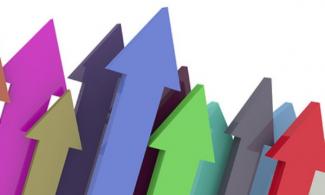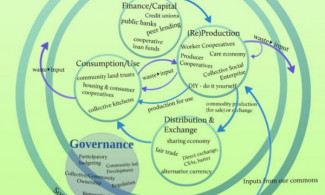"Fall in love with hard and patient work-we are the beginning, not the end."
-Zizek, at #OccupyWallStreet
"Lost my job, found an occupation!"
- sign at #OccupyWallStreet
An Introduction
#OccupyWallStreet has cracked open a little hole in history, creating a moment where some of the very core institutions of our economy are called into question. Along with indignation and outrage, there is a certain excitement in the air. Things that have been terrifyingly stuck seem to be moving. Something seems possible today that wasn't just a month ago. In this space, our conversations and our imaginations are buzzing. What are we doing? What should we do? What's coming next? In particular: as we condemn this economy built for the benefit of the 1%, what do we want in its place, and how will we build it?
This text, grounded in several years of collective thinking and writing, is meant to be a contribution to this vibrant conversation. My basic premise is this: if we want to effectively envision and create alternatives to the economy of Wall Street, we need to re-think the very concept of "the economy" itself. We have inherited an economics that stifles our imaginations and dampens our collective sense of power and possibility. Only by telling new stories about what economies are (and might yet be) can we most effectively kindle the fires of our creative, transformative work to build new forms of livelihood. I propose here a set of five core economic principles for "rethinking the economy" that might be helpful steps in this process, and may also usefully inform the direction of our concrete strategies. Our work can be strengthened by:
(1) shifting from a mind-numbing concept of "the economy" to more enabling concepts of diverse forms of livelihood;
(2) moving beyond the destructive tension between "economy" and "ecology" in conventional economics to an acknowledgement of our participation in a community of life;
(3) challenging our either/or thinking about "the market" and "the state" and opening up creative political space within and beyond these institutions;
(4) escaping the limiting logics of "economic laws" that tell us what we can and cannot do, and embracing the work of creating new possibilities through collective imagination and action; and, finally,
(5) reclaiming economics from the "experts" to become a practice of solidarity-building and democratic organizing in which it is "we the people" who can and must make our own economies.
These are not proposals for an alternative economic "system" to replace the current one. They are, rather, a set of tools to support our diverse, collective work of imagining new livelihoods together. This text is part theory, part strategy and part call-to-action for the immediate and long-term work of identifying and seizing spaces of democratic practice (occupy!), linking them together in networks of mutual support and recognition (connect!), and drawing on our collective strength to actively create new ways of meeting our needs and making our livings (create!).
The #Occupy Movement is a vital spark, already creating and demonstrating-in public experiments with democracy and solidarity across the U.S. and around the world-elements of the new economies we are working to build. This movement calls us toward long-term commitments, generations of work that we have only just begun. Everything is at stake.
I refer quite often, in these pages, to a "we." Who is this "we"? It is everyone who reads these words and finds some resonance with them; it is everyone who participates in the larger conversation (of which this text is one tiny part) about what it means to be alive at this moment in history, and about what it means to respond to the urgent call for occupation, connection and creation. The "we" is you, and you, and you, and I, who are ready to roll up our sleeves and get to work on building a different way of living together on this earth.
This is Our Moment
The #Occupy Movement that is spreading like wildfire across the United States and around the world is a wake-up call. We are standing at the edge of the world as we know it, and the question is whether our future will simply happen to us, or if we will participate in its making.
We're in a hell of a mess. Major economies of the world are coming unravelled, teetering at the edge of all-out crisis and living by the fickle mercy of volatile financial markets. Many of us who once relied on the basic economic institutions of our societies-education, employment, healthcare, public infrastructure, retirement, social assistance in times of need-are confronting the brutal reality that such faith is no longer merited. Meanwhile, the "experts" poised to deal with this mess are working in the service of the very institutions that profit from it. Nor do we have any reason to believe that their ideas, which have torn apart our lives, our communities and our environment, have anything to offer us in the work of weaving them back together.
And what if these experts could "fix" our economy? What if we could convince them to "curb the excesses of Wall Street" and get our economic engine "back on track"? This demand would ignore the fact that the very success of the capitalist market economy-the ways in which it has seemingly provided so many with so much in so short a time-is built on violence and plunder. For every glorious triumph of economic growth and progress, there has always been another story unfolding behind the magic curtain: the story of enclosure and colonization, of slavery and military coercion, of the exploitation of working people, of the suppression of struggles for dignity and justice, of the unravelling of culture and community, and of the looting and destruction of ecosystems around the world.
The sorcery of capitalist economics is precisely to make its own violence invisible, so that it can appear to be nothing but the miraculous liberator of human potential and the progressive deliverer of ever-abundant goods. And there is a disturbingly good reason for us to give in to this illusion: most of us are dependent on the very economy that has systematically exploited us and undermined the health of our communities and our environments. We have come to rely on the very "job creators" (that new euphemism for exploiters) whose project of profiting at our expense we condemn. We have come to need the very economic growth machine that is eating our world and destabilizing our planetary climate in the name of "progress."
We can no longer ignore the immense challenge at the heart of this moment in history: We are trapped in patterns of life on which we have come to depend, but which we must fundamentally transform as a matter of our very survival. How do we acknowledge our dependence, and address the needs that it gives rise to, while also imagining and constructing new forms of freedom?
The politics of our age must be the politics of our creative and collective escape from this historical trap. We are called toward new ways of understanding our realities and experiencing our capabilities. We are called to work in solidarity with each others' daily struggles to gain footholds of stability on which to build a different future. We are called to imagine and create new ways of meeting our needs and living together on this shared earth. We are called to participate not just in the emergence of new movements, but of new forms of living. This is not about "reform" nor "revolution," but about how we build relationships, communities, and institutions that simultaneously meet our immediate needs and open up possibilities for other forms of livelihood. As the old ways crumble, as we face the non-viability of the economic machine that has chewed us up and spit us out, this is no longer a matter of "alternatives." It is a matter of survival.
And so it's time to play for keeps.
This work challenges us at many levels. We are learning how to cooperate and how to be democratic people, struggling against a culture that has taught us otherwise. We are learning how to work on ourselves, facing up to our inherited "shit" with honesty, courage and compassion, so that we can become the change we wish to see. We are discovering new forms of satisfaction and identity as we leave the world of endless consumption behind. We are creating new forms of trust, inventing new forms of community, and building new forms of personal and collective security beyond bank accounts, retirement funds and formal employment. We are developing new skills and new forms of awareness as we create livelihoods connected to our places and contexts. We are learning from struggles of the past and, with the strength of this wisdom, imagining new forms of collective action to take back land, water, housing, healthcare, culture, infrastructure, and institutions of governance from those who have enclosed them for private profit at our expense.
To strengthen all of this work, we are beginning to tell new stories.
This part of our task cannot be underestimated. The #Occupy Movement is directly confronting, in ways not seen for generations, the power of the economic status quo. We are up against the most sacred institutions of our society, and challenging some of the most powerful stories that our civilization has told over the past two hundred years. These are stories that run deep, and that structure our imaginations and political sensibilities in ways that we are often barely aware of. It is all-too-easy for us to challenge the inequities of our economy without questioning the very concept of "the economy" itself.
We might be tempted to agree with Paul Krugman when he writes that "it's clear what kinds of things the Occupy Wall Street demonstrators want, and it's really the job of policy intellectuals and politicians to fill in the details."i This would be our worst mistake. The peril that we must avoid at all costs is to hand over our power, once again, to the self-righteous economists and the pragmatic managers of the financial machine.
This is our moment.
This is the time when we must refuse to accept the old ideas, the old concepts, the old stories. This is the time when we need to create new, shared stories about what it means to be alive together, about what it means to make a living, about what is possible for us to dream of and create, and about how it is that we, the people, will make a future for ourselves.
If the economists want to join us, all the better. But they can check their economic "laws" at the door, thank you very much.
Next: Part Two, "The Name of the Trap is "The Economy"...
- 8.5 x 11 size (this one prints out nicely on letter-sized paper)
- Booklet-size (this one is easy to read on a computer screen)
- Ready-to-fold 'zine version (you can print this version and distribute it in your community or at your #occupation)
i Paul Krugman. "Confronting the Malefactors." New York Times. October 6, 2011.
Gratitude to Kate Boverman, who inspired this piece and provided crucial ideas and support, and to Michael Johnson, Annie McShiras, Cheyenna Weber, Len Krimerman and Anne O'Brien for their excellent thoughts and edits.
Ethan Miller is an activist, educator and researcher working to cultivate and support movements for solidarity-based economic transformation. He works with Grassroots Economic Organizing and the Community Economies Collective, and has lived for the past ten years at the JED Collective and Giant's Belly Farm in Greene, Maine. Ethan is currently on a hiatus in Australia, working on a PhD at the University of Western Sydney with the Community Economies Research Group.
Email Ethan at: leaving.omelas (-at-) gmail.com



Add new comment